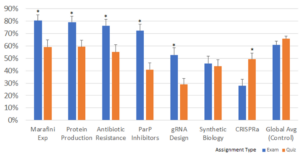Naomi Levy-Strumpf
Course/ProgramIntroduction to Fundamental Genetics & it’s Applications HMB201H1: The course provides a comprehensive introduction to a variety of therapeutic approaches including gene therapy, CRISPR-based gene editing, epigenetic manipulations & regenerative medicine. It consists of three parts: tools & techniques of gene & genome manipulations; medical, environmental and agricultural biotechnology applications; and ethical, legal and social aspects of modern biotechnology as it pertains to human health and wellbeing. |
Design Context
HMB201H1 offers a variety of preparatory material (lecture notes , study guides, supplemental readings, short video clips, etc.). It was therefore interesting to know if students were effectively accessing the different resources, and whether this engagement was associated with mastery of key concepts.
The goal was to redesign the course around students, enhance resources that students are naturally drawn to and find most helpful, and leverage analytical insights to design effective interventions that will positively impact student learning.
Instructional Challenge
The following questions were addressed; can I:
- Identify the most effective & impactful resources: what do students interact with & how, can we correlate it with success in the course?
- Identify frequently used resources: aiming to curate supplementary materials according to what students are naturally drawn to.
- Glean useful data to enable student-centered strategic interventions: taking an informed approach to help students achieve greater mastery of foundational concept?
- Assess the impact of strategic interventions on the mastery of key concepts?
Design Strategy
We tracked student engagement, measured by the number of views and timing of access to the different resources and how it correlates with mastery of concepts as measured by performance on weekly quizzes.
Furthermore, we gleaned data from weekly quizzes and designed strategic interventions to address gaps and misconceptions leading to deeper comprehension & greater mastery at the completion of the course.
Use of Data to Inform Design Iteration and Instruction
The data identified the study guides as an impactful resource. This insight will be shared with students to encourage more students to take advantage of this resource.
The data clearly demonstrated that “cramming” or reviewing the material shortly before the assessment, is not as effective as paced-learning and demonstrated the value of peer-to-peer learning.
These evidence-based insights will be shared with students to emphasize the benefit of paced-learning and group work. This will enable students to make informed decisions on their own learning practices.
Lastly, the data demonstrated that data driven strategic interventions can have a measurable impact on student success. Students performed.
On average students performed similarly on the weekly tutorial quizzes compared to the final exam (right side bars); information-based strategic intervention changed the trajectory of student success within the time frame of a single semester. Furthermore, it identified topics that require a different approach in the next iteration of the course.

Average Scores on Final Exam (Post Intervention) Versus Average Scores on Tutorial Quizzes (Pre-Intervention)
Next Steps
Given the success of the data driven strategic interventions, this approach will be implemented in future iterations of this course as well as in other courses, such as our large General & Human Genetics course (HMB265H1).
To enable students to make informed decisions of their own learning practices, the information gleaned from this study and the evidence-based impact will be shared with students to advocate for effective study skills and provide evidence-informed guidance.
I plan to continue exploring adaptive design and the outcomes of strategic interventions. Furthermore, I would like to use the data to track students in need and positively reinforce effective learning strategies.
Lastly, I am looking forward to conducting a comprehensive overview of resource effectiveness: Unfortunately, we could not reliably track the number of views of lecture recordings, or any supplemental material provided in the form of external links. Going forward, links will be embedded in pages to enable a more comprehensive view of how students interact with the full range of course resources, and how it correlates with mastery of key concepts and their ability to apply the knowledge.
